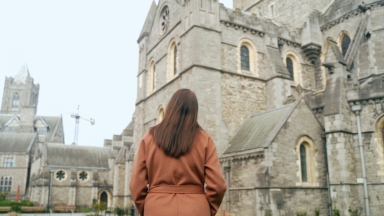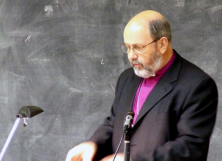
The UK government seems to suggest every few months that it's going to get rid of the Human Rights Act. So far it remains on the statute books. Plans to replace it with a British Bill of Rights never seem to get off the drawing board, but maybe the outcome of the EU Referendum will change that.
Into this uncertain environment, a new book has been published which examines the Judeo-Christian basis of human rights and suggests a religious basis should be maintained for any future Bill of Rights. The book – Religious Approaches To Human Rights, by Martin Davie – was published this month.
It has drawn the anger of the National Secular Society in a blog on its website, penned by NSS executive director, Keith Porteous Wood. In it he offers a sort-of review of the book as well as reporting on the launch event in Parliament.
According to the introduction he, "Offers a critical review of a new book that claims Human Rights owe their existence to religion – when the greatest modern threat to Human Rights comes from organised religion."
Upon this obvious non sequitur, he bases his whole review (and I might add, much of the approach of the NSS). The argument seems to be that because some religiously inspired regimes around the world are horribly repressive, then human rights can't possibly have had a religious background in the first place. Not only is this philosophically incoherent, it's historically inaccurate – it's an indisputable fact that the concept of human rights developed in a Christian context.
Firstly, let's deal with Porteous Wood's opposition to the repression and violence which is commonplace in certain religious regimes around the world. On this, he and I are of one mind. He highlights Saudi Arabia as one of the most depraved regimes in history (as I've written about here) and there is no doubt that the extreme Salafist form of Sunni Islam promoted by the country's leading religious authorities is to blame (it also inspires ISIS).
I'll stand shoulder to shoulder with the NSS and anyone else who opposes the UK government's support for Saudi Arabia and its horrific regime. But does Porteous Wood really believe it's credible to equate any group which is 'religious' with the bloodthirsty theocrats of Saudi Arabia??
However bad the Saudis are (or the Iranians, or any other repressive religious regime) though, that tells us nothing about the development of human rights. 'Human rights' as a concept is a relatively recent invention, but it has been built on centuries of development in European thought from the Church Fathers, through medieval philosophy, through the Enlightenment and into the 21st century.

While not all those debating the development of human rights would have described themselves as Christians (Spinoza, Thomas Paine...), they were working in a distinctly Christian environment. The ground had been laid by Aristotle, via Thomas Aquinas.
Porteous Wood seemingly rejects this. He says, "Natural rights" (whatever they are, I suspect natural in the eyes of the beholder)." In one fell swoop, he dismisses centuries of argument and debate and defenestrates the philosophy of giants like John Locke, Thomas Hobbes and Hugo Grotius. But no matter, because Porteous Wood and the NSS don't seem especially interested in where human rights come from – merely that they want to assert that they are 'a good thing'.
This is naïve. The NSS says it exists to, "Uphold the universality of individual Human Rights." That's admirable, but human rights were not created ex-nihilo by the European Convention or the Universal Declaration. They have a basis in the Judeo-Christian worldview. Nick Spencer from Theos has demonstrated how equality and toleration (two key concepts in the foundation of human rights) come from the English Bible.
If human rights don't have a religious basis – as the NSS seems to want to argue – then where do they come from? We need to be told how a secular campaign group seeks to persuade the rest of us that human rights are inherently good. They must do more than merely give examples of bad religious regimes from around the world. Indeed, Christians are only too aware of the systematic denial of human rights – as the most persecuted minority in many parts of the globe (something which, in fairness, the NSS does mention).
It isn't that there can't be a secularist basis for human rights (although I struggle to see how the inherent dignity and therefore rights of each human are grounded on a purely atheistic basis) it's just that Porteous Wood utterly fails to make a coherent case for it. There are some vague allusions to secularism being neutral and fair to all – something which just isn't true.

To spend a blog saying how dreadful various religious crimes have been doesn't get us anywhere. Many secularist regimes have been beyond gruesome – Pol Pot's Cambodia, Stalin's Soviet Union and Mao's China to name but three. Yet it would be unfair for me to suggest these represent secularism. Instead I'd like to have a grown-up conversation about how, in a pluralist society like the UK or the USA, we can talk about human rights, their origin, our obligations to each other and more – while acknowledging that we are products of our Judeo-Christian heritage. Without it, human rights are not axiomatic.
The Church has, of course, abused its power over the centuries. There are dreadful religiously motivated regimes around the world. No one doubts these facts. Yet to suggest that because of them, we should deny where human rights comes from in the first place, is overkill. Let's have a proper conversation about how we live together as religious and non-religious people in a plural society, rather than tarring all people of faith with the Saudi brush. It's boring, banal and doesn't get us anywhere.

















